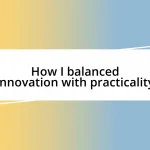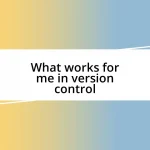Key takeaways:
- Code reviews enhance learning, foster collaboration, and develop key skills such as effective communication, critical thinking, and empathy among team members.
- Constructive feedback is vital; it should be specific, supportive, and include practical examples to encourage growth and a culture of trust among developers.
- Utilizing tools like GitHub and integrating practices such as mini-reviews and feedback checklists can significantly improve the code review process and enhance team productivity.

Understanding code reviews benefits
When I first started participating in code reviews, I was surprised by how much I didn’t know. It’s not just about finding bugs or improving functionality; it’s about fostering a community of learning. Have you ever noticed how explaining your code to someone else reveals gaps in your own understanding? That’s one of the most enriching parts of the review process for me.
Engaging in code reviews also significantly sharpens my problem-solving skills. Each review involves dissecting someone else’s logic and identifying potential pitfalls, which I find incredibly exciting. I remember the first time a colleague pointed out an optimization in my code. Not only did my program run faster, but I also felt a rush of gratitude for the shared knowledge. It was a reminder that collaboration can elevate our work to new heights.
Moreover, I truly believe that code reviews enhance the sense of ownership within a team. When everyone contributes to the review process, it fosters accountability and mutual respect. Have you experienced that moment of pride when your feedback helps someone else improve their work? It’s a powerful feeling, strengthening both the individual and the collective. These interactions create a safety net where we can openly share ideas and grow, ultimately leading to better software development practices.

Key skills developed through reviews
Through my experience with code reviews, I’ve honed several key skills that I didn’t initially anticipate. The ability to communicate complex ideas clearly is paramount. I recall one instance where I had to explain a particularly tricky algorithm I implemented. Breaking it down for my peers forced me to analyze my thought process, ensuring that I understood each step even more thoroughly myself. This kind of clarity has not only improved my coding but also my capacity to mentor others.
Here are a few skills I’ve developed through the review process:
- Effective communication: Articulating complex ideas in simple terms.
- Critical thinking: Analyzing various approaches to problem-solving.
- Empathy: Understanding where others might struggle, allowing for more constructive feedback.
Additionally, I’ve developed a keen eye for detail. Early on, I often missed small issues in my own code, but during my reviews, I noticed myself catching nuances that I’d previously overlooked. I vividly remember a time when I spotted a minor logical error in a teammate’s function. It felt rewarding to share that insight and see the immediate impact on the final implementation. This attentiveness not only boosts code quality but also cultivates a deeper connection with my team’s work, enriching our collective coding journey.

Constructive feedback in coding
Giving and receiving constructive feedback is a crucial aspect of coding that I’ve come to appreciate through my experiences. I remember vividly a session where I received feedback on a particularly challenging piece of code. Initially, I felt defensive, but as I listened, I realized my colleague was genuinely invested in my growth. This moment taught me that constructive feedback isn’t merely criticism; it’s a valuable gift that helps each of us improve. It fosters a culture of trust, where we encourage one another to push boundaries.
During these reviews, I’ve learned that effective feedback must be balanced—specific yet supportive. For example, instead of merely saying, “This part doesn’t work,” I try to offer insights like, “Consider how you can simplify this function for better readability.” Sharing practical examples can really help clarify my point. Over time, I found that nurturing a collaborative spirit made my feedback more impactful. I often felt a sense of satisfaction when my suggestions led to a stronger codebase or helped a teammate gain a new perspective.
Constructive feedback also opens up rich conversations. One time, while reviewing a peer’s code, we dove into a discussion about different algorithms for solving a problem. It was fascinating to see how different approaches can lead to the same outcome, and I remember walking away from that exchange with fresh ideas for my own projects. This is exactly why I believe constructive feedback is not just about improving code, but about broadening our horizons and becoming better developers together.
| Constructive Feedback Characteristics | Impact on Developers |
|---|---|
| Specificity | Helps in pinpointing areas for improvement |
| Supportive Tone | Cultivates a safe environment for sharing |
| Examples and Alternate Solutions | Encourages creative problem-solving and knowledge sharing |

Importance of diverse perspectives
The value of diverse perspectives in code reviews cannot be overstated. I’ve found that when my teammates come from various backgrounds, they bring their unique insights and experiences to the table. I recall a particular moment when a colleague with a non-traditional coding background suggested a solution I’d never considered. It not only opened my eyes to a new way of thinking but also reminded me how diversity fuels creativity. Isn’t it fascinating how different experiences can lead to innovative solutions?
Engaging with perspectives outside my own has profoundly influenced my problem-solving approach. I often think about a time during a review when a teammate proposed a design pattern that was entirely new to me. Initially, I was hesitant and unsure of its practicality. However, the discussion that followed made me appreciate the merits of thinking outside the box. By exploring alternative viewpoints, I realized that some of the most effective solutions often emerge from unexpected ideas. It makes me wonder: how often do we limit ourselves by sticking to familiar concepts?
This blend of different perspectives not only enhances our technical solutions but also fosters a richer team dynamic. I’ve seen firsthand how these open discussions promote a culture of respect and understanding. When everyone feels comfortable sharing their thoughts, we build a supportive environment where creativity thrives. It’s truly rewarding to witness the way our collective contributions can elevate a project beyond what any of us could achieve alone. Don’t you think such collaborative energy is what makes us better developers?

Effective communication in reviews
Effective communication during code reviews is paramount. I’ve found that the tone in which feedback is delivered can significantly influence how it’s received. One time, I sarcastically commented on a bug in a teammate’s code, only to realize it caused unnecessary tension. From that experience, I learned the importance of delivering feedback with empathy. When we frame our comments positively, it creates a safe space for open dialogue.
I also believe that clarity is essential in our exchanges. Instead of just pointing out mistakes, it helps to articulate the “why” behind the feedback. For instance, I once explained to a colleague why a certain approach might complicate our codebase. By providing context, we opened a discussion about best practices, allowing us to align on a more robust solution together. This journey of understanding often leads to deeper insights for everyone involved.
Additionally, asking questions can spark valuable conversations. I remember asking a peer during a review, “What would happen if we approached this from a different angle?” That simple question not only encouraged exploration but also empowered my teammate to think critically about their code. It’s moments like these that highlight the essence of effective communication in reviews: fostering an environment where we can learn from each other and grow as a team. Don’t you think that collaboration thrives on such curiosity?

Tools to enhance review process
Tools can significantly enhance the code review process, making it smoother and more productive. For instance, I’ve often relied on tools like GitHub and GitLab, which allow seamless collaboration during reviews. The built-in commenting features help keep discussions organized and accessible, allowing both the reviewer and the author to refer back to specific lines of code easily. Have you ever found yourself lost in a sea of comments? These platforms help clarify those conversations remarkably.
In my experience, integrating linting tools into the review process can be a game-changer. Linting tools automatically check for potential errors and enforce coding standards before the review even begins. I once implemented ESLint in a project I was working on, and it drastically reduced the number of trivial issues we had to discuss. Instead of getting bogged down by minor syntax errors, we could focus on the more complex logic and design decisions that mattered most. How liberating it feels to dive straight into meaningful discussions!
Moreover, utilizing project management tools like Jira or Trello alongside your version control system can enhance transparency and accountability in the review process. I’ve seen teams benefit from linking code reviews to specific tasks or features. It not only provides context to the review but also clarifies the goals. When the team understands the bigger picture, discussions become more focused and aligned. Have you noticed how this alignment transforms the nature of conversations? It’s all about clarity and purpose!

Implementing lessons learned in practice
Implementing lessons from code reviews is where the real magic happens. I remember one project where I decided to apply the feedback I received about modularity. By breaking down larger functions into smaller, well-defined ones, I not only enhanced my code’s readability but also made it so much easier for others to contribute. Have you ever felt the satisfaction of seeing your work become a shared asset? That transformation was both inspiring and empowering.
On another occasion, I integrated a practice of conducting “mini-reviews” within my team for smaller code changes. I found that these shorter sessions kept everyone engaged and reduced the pressure of a formal review. It was amazing to see how this relaxed atmosphere led us to catch issues early and foster more creativity in our solutions. Why do you think creating a comfortable environment could lead to better results?
Moreover, tracking the implementation of feedback through a simple checklist has been a game-changer for me. Initially, I sometimes overlooked suggestions that seemed minor, but putting them down on paper helped me stay accountable. It became a rewarding ritual to tick off those boxes, reflecting on how even the smallest adjustments could elevate the codebase. Don’t you think consistency in applying lessons learned can create a noticeable impact over time?












